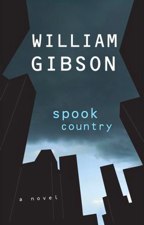Spook Country
 Last night I finished Spook Country, William Gibson’s most recent novel. Twittered snark aside, it’s actually quite good — probably the best Gibson novel I’ve read, although it’s mostly a do-over of Pattern Recognition, and of course will never be as influential or noteworthy as Neuromancer.
Last night I finished Spook Country, William Gibson’s most recent novel. Twittered snark aside, it’s actually quite good — probably the best Gibson novel I’ve read, although it’s mostly a do-over of Pattern Recognition, and of course will never be as influential or noteworthy as Neuromancer.
It’s definitely worth a read, I think, if only for the unsettling sensation of being unsure whether Gibson has figured out how to relate to the present or if it’s just that the present has become more compatible with his style. It’s also a book that, when all is revealed, seems well-suited to the particular moment of our 9/11 coping process.
Anyway, I say all of this by way of introducing the following passage (which is spoiler-free, I think, although others might disagree):
“I remember seeing proofs of a CIA interrogation manual, something we’d been sent unofficially, for comment,” the old man said. “The first chapter laid out the ways in which torture is fundamentally counterproductive to intelligence. The argument had nothing to do with ethics, everything to do with quality of product, with not squandering potential assets.” He removed his steel-rimmed glasses. “If the man who keeps returning to question you avoids behaving as if he were your enemy, you begin to lose your sense of who you are. Gradually, in the crisis of self that your captivity becomes, he guides you in your discovery of who you are becoming.”
“Did you interrogate people?” asked Garreth, the black Pelican case under his feet.
“It’s an intimate process,” the old man said. “Entirely about intimacy.” He spread his hand, held it, as if above an invisible flame. “An ordinary cigarette lighter will cause a man to tell you anything, whatever he thinks you want to hear.” He lowered his hand. “And will prevent him ever trusting you again, even slightly. And will confirm him, in his sense of self, as few things will.” He tapped the folded paper. “When I first saw what they were doing, I knew that they’d turned the SERE lessons inside out. That meant we were using techniques the Koreans had specifically developed in order to prepare prisoners for show trials.”
I have no idea if the above is true, but it’s certainly an interesting idea: that, when it comes to torture, black & white bellicosity is a meme capable of self-preservation, rather than just a manifestation of the torturer’s ignorance and imcompetence. Failing to get results, forcing everyone to play their assigned parts with conviction — that’s actually the point.




 The only thing I feel like writing about at the moment is how much it stinks to be sick and how much I’d rather be on my couch
The only thing I feel like writing about at the moment is how much it stinks to be sick and how much I’d rather be on my couch 


